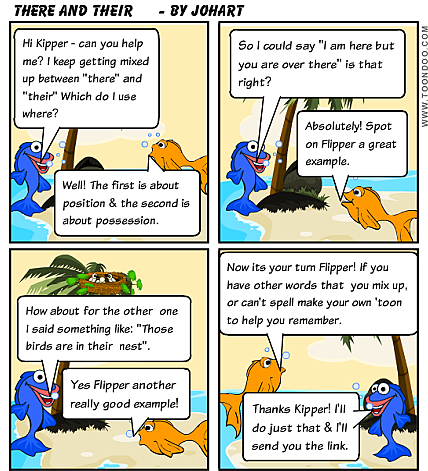Introduction
my students are all off-campus and so are using their own computers with widely varying software. Many of my students are also not particularly computer literate so expecting them to use sophisticated features of word processing or presentation packages is not an option. The strategy I adopt for a lot of work with my online students is to use mostly (though not always) online tools. This post is about using one of them – ToonDoo – an online cartoon making tool.
How do we use ToonDoo?
I have been using ToonDoo myself for several years to create occasional texts to engage student attention and to break up heavily text based resources.
Then about 3 years ago I first used it with online students when we created a cartoon together via virtual classroom (Elluminate). Each student was given control of my desktop in turn to add their own “bit” to the cartoon. These students then signed up to ToonDoo and made their own cartoons. I have also shared my use of ToonDoo fairly widely through webinars and associated blog posts.
Recently I have extended the use of ToonDoo with my students as part of my National Vocational E-Learning Strategy project Extraordinary Learning For A Digital Age (ELFADA) funded under the Partnerships for Participation initiative. This was part of a mini-project on digital safety. The students learnt about ToonDoo in a virtual class session through an Application Share demo and together we created a Toon. This was shared through the course blog in a post on visual texts.
 |
The next step was for the students to visit a series of links to cartoons each addressing an aspect of digital safety. They chose some of these to review and evaluate. |
Finally the students created their own cartoon choosing a topic from those they had learned about through our work on staying safe online, they then published a blog post with links to their cartoon, or with the cartoon embedded. These are two of the student posts, Jordan’s looking at scams and some consequences and Meg’s with a warning to take care what you share.
Conclusion
I have found using ToonDoo to be a great engagement tool for students and will continue to use it with my own online students. I also find that ToonDoo is used easily by students across all three levels that I currently teach online. In common with many other online tools it is relatively simple to use – this is a huge bonus for online students who don’t always have a lecturer available for immediate help.
Please use the comments to share your own and your student experiences with ToonDoo or other cartoon making tools. Or if it is new to you let us know if you think you might try this with your own students.
Jo Hart


 Karrayili has been delivering Driver Education for the last 25 years supporting Fitzroy Crossing, town communities and communities of the Fitzroy Valley. For more information contact General Education Coordinator, Emilia Biemmi Beurteaux on 08 9191 5333.
Karrayili has been delivering Driver Education for the last 25 years supporting Fitzroy Crossing, town communities and communities of the Fitzroy Valley. For more information contact General Education Coordinator, Emilia Biemmi Beurteaux on 08 9191 5333.
